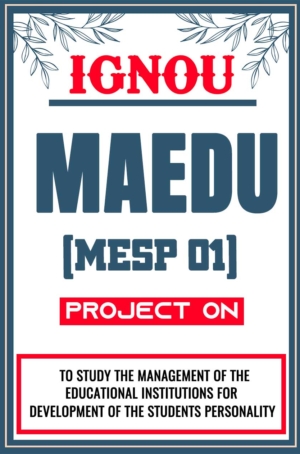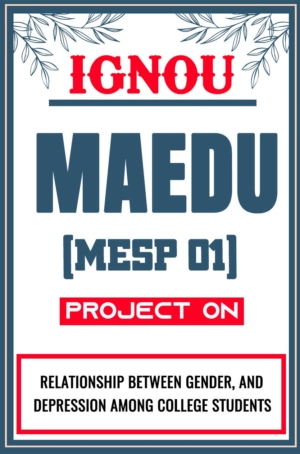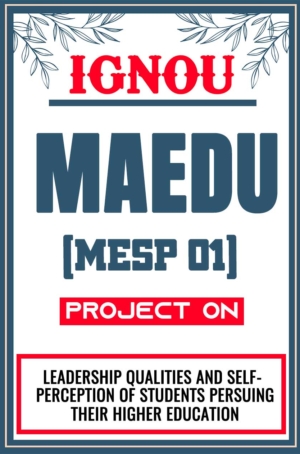Download IGNOU MAEDU Project & Dissertation (MESP 1)
The IGNOU MAEDU Project includes a project component known as MESP 1 in MA Education Programme to its learners in IGNOU. This IGNOU MAEDU Project is an essential part of the curriculum and aims to provide students with practical research experience in the field of education.
The goal of the IGNOU MAEDU Project is to provide you with the necessary research skills so that you may do research in education and actively engage in educational debate.
Whatsapp us to get the Personalized (Customized) or Readymade IGNOU MAEDU Project Dissertation or IGNOU MAEDU Proposal Synopsis
IGNOU MAEDU Project Topics Examples:
- Leadership Qualities and Self-Perception of Students Pursuing Their Higher Education
- A Study on Scholastic Backwardness in Children
- Relationship between Gender, And Depression among College Students
- A Study of the Academic Achievement and Social Intelligence of Students at University
- A Study on Locus of Control and Academic Achievement of Graduate Students
- Attitude and Leadership Qualities of Delhi University Students
- Effect of Arithmetical Ability and Study Habit on the Achievement in Mathematics at Secondary School Students
- To Study the Management of the Educational Institutions for Development of the Students’s Personality
How do you determine a research gap in your area of interest?
Determining a research gap is an important step in developing a significant and impactful research project. Here’s a structured approach to help you determine a research gap in your area of interest, particularly for your IGNOU MAEDU Project (MESP 1):
1. Evaluate Existing Literature:
- Conduct a Literature Review: Start by reviewing relevant literature in your field of interest. Look for recent studies, research papers, books, and other scholarly sources.
- Identify Current Trends: Note the current trends, theories, and topics that have been extensively researched.
- Note Common Findings: Identify recurring themes, conclusions, or gaps that emerge from the literature.
2. Critically Evaluate Existing Research:
- Identify Limitations: Analyze the limitations of existing studies. These can include methodological issues, sample size limitations, scope restrictions, or outdated data.
- Look for Contradictions or Inconsistencies: Note any contradictory findings or areas where research results are inconclusive or inharmonious.
- Consider Emerging Areas: Look for emerging areas within your field where research is sparse or where new developments suggest the need for further investigation.
3. Consult with Experts and Peers:
- Discuss with Your Supervisor: Consult your supervisor or mentor about potential research gaps they have identified or areas where further exploration is needed.
- Engage in Academic Discussions: Participate in academic discussions, seminars, or conferences related to your field. These forums can provide insights into current debates or overlooked topics.
4. Brainstorm and Reflect:
- Reflect on Personal Experience: Consider your own experiences, observations, or professional insights that may highlight areas needing further exploration.
- Brainstorm Ideas: Generate ideas based on gaps you have identified in the literature or from discussions with peers and experts.
- Narrow Down to Specific Topics: Focus on narrowing down your topic to a specific research question that addresses a significant gap.
5. Formulate Your Research Question:
- Define a Clear Research Question: Formulate a clear and specific research question that addresses the identified gap. Your question should be explorable and feasible within the scope of your project.
- Ensure Originality: Ensure that your research question contributes something new to the existing body of knowledge and is not merely repeating what has already been studied.
6. Justify the Importance of Your Research:
- Highlight Significance: Clearly articulate why addressing this research gap is important. Consider the potential implications of your findings for theory, practice, policy, or further research.
- Align with Your Goals: Ensure that your chosen research gap aligns with your academic and career goals, as well as the objectives of the MAEDU program.
7. Seek Feedback and Refine:
- Present Your Proposal: Present your proposed research question and rationale to your supervisor or mentor. Seek feedback on whether the gap is sufficiently identified and justified.
- Revise as Needed: Revise your research question and approach based on feedback, ensuring it meets academic standards and addresses a clear gap in the literature.
Where can you find additional resources and guidelines for the IGNOU MAEDU Project?
To find additional resources and guidelines specifically for the MAEDU Project (MESP 1), you can refer to several sources that provide comprehensive information and support:
1. IGNOU Official Website:
- IGNOU MAEDU Program Page: Visit the official IGNOU website and navigate to the MAEDU program section. Look for specific details, guidelines, and resources related to the MESP 1 project.
2. IGNOU Study Material:
- Course Guides and Study Materials: IGNOU provides study materials, course guides, and handbooks that outline the requirements and expectations for the MESP 1 project. These materials can often be accessed online through the student portal or physical copies distributed by study centers.
3. IGNOU Regional Centers:
- Contact Your Regional Center: Each IGNOU regional center provides support and guidance to students enrolled in the MAEDU program. Contact your regional center directly or visit in person to access resources, attend workshops, and clarify any queries related to your project.
4. MAEDU Program Coordinators:
- Supervisors and Coordinators: Your assigned supervisor or program coordinator plays a crucial role in guiding you through the MESP 1 project. Schedule regular meetings to discuss your project progress, seek feedback, and obtain additional resources or clarifications.
5. Online Libraries and Databases:
- E-Resources: Utilize online libraries and academic databases to access scholarly articles, research papers, and books related to your research topic. IGNOU may provide access to specific databases through its library services.
6. Academic Journals and Publications:
- Educational Journals: Explore relevant academic journals in the field of education to stay updated on current research trends, methodologies, and findings. Many journals offer open-access articles or subscriptions through university libraries.
7. Workshops and Seminars:
- Training Programs: IGNOU and its regional centers often organize workshops, seminars, and training programs for MAEDU students. These events can provide valuable insights into research methodologies, project management, and presentation skills.
8. Peer Support and Discussion Forums:
- Student Networks: Engage with fellow MAEDU students through online forums, social media groups, or study circles. Peer support can provide practical advice, shared experiences, and moral encouragement throughout your project journey.
9. Online Resources and Guidelines:
- Online Platforms: Look for official IGNOU publications, guidelines, and resources available on the internet. These may include FAQs, project templates, and formatting guidelines specific to the MESP 1 project.
10. Faculty and Expert Consultations:
- Expert Advice: Seek guidance from faculty members, subject matter experts, or professionals in the field of education. They can offer valuable perspectives, critique your research approach, and suggest relevant resources.
Can you collaborate with other students on your IGNOU MAEDU Project?
MAEDU Project is structured as an individual assignment where each student is expected to independently conduct and complete their research project. However, there may be specific circumstances or exceptions where collaboration with other students could be considered or allowed:
Considerations for Collaboration:
- Consult IGNOU Guidelines: Review the specific guidelines provided by IGNOU for the MAEDU program and the MESP 1 project. These guidelines outline whether collaboration is permitted and under what conditions.
- Supervisor Approval: If collaboration is allowed or encouraged, seek approval from your project supervisor or coordinator. They can provide guidance on how to structure collaborative efforts and ensure that individual contributions are clearly defined and assessed.
- Nature of Collaboration: Clarify the extent and nature of collaboration with other students. For instance, collaboration may be allowed for certain aspects of the project, such as literature review or data collection, while individual analysis and reporting remain independent.
- Academic Integrity: Maintain academic integrity by clearly attributing contributions from each collaborator and ensuring that all work submitted represents your own understanding and effort. Avoid plagiarism and uphold ethical standards throughout the collaborative process.
- Learning Objectives: Consider how collaboration aligns with the learning objectives of the MESP 1 project. Collaboration can offer benefits such as shared insights, diverse perspectives, and mutual support, but it should also align with the educational goals of demonstrating independent research skills.
What should you do if you encounter technical problems during data collection for IGNOU MAEDU Project?
Encountering technical problems during data collection can be frustrating, but there are several steps you can take to address and resolve these issues effectively:
1. Stay Calm and Assess the Situation:
- Remain composed and avoid panicking: Take a moment to assess the nature and extent of the technical issue.
2. Troubleshoot the Problem:
- Identify the Specific Issue: Diagnose the exact nature of the problem. Is it related to hardware, software, connectivity, or data storage?
- Check Equipment: Ensure that all equipment (e.g., devices, sensors, recording equipment) is functioning properly and is adequately charged or powered.
- Software Issues: If using specific software for data collection, check for updates, restart the application, or reinstall if necessary.
- Internet Connectivity: Verify internet connectivity if data collection involves online surveys, video conferencing, or cloud-based data storage.
3. Seek Technical Support:
- Contact IT Support: If you are in an institutional setting, reach out to IT support staff or technical experts designated to assist with research-related issues.
- Consult Manuals or Guides: Refer to user manuals, troubleshooting guides, or online resources provided by the equipment or software manufacturer.
4. Implement Contingency Plans:
- Backup Data: Regularly backup collected data to prevent loss in case of technical failures.
- Alternative Methods: Consider alternative data collection methods or tools if the current setup is not working. For example, switch to manual data entry or use different devices.
- Reschedule if Possible: If the issue cannot be resolved promptly, consider rescheduling data collection sessions to a later time when technical difficulties can be addressed.
5. Document the Incident:
- Keep detailed records of the technical problem encountered, steps taken to resolve it, and any impact on data collection timelines or quality. This documentation may be useful for reporting to supervisors or examiners if needed.
6. Communicate with Stakeholders:
- Notify Participants: If data collection involves participants, inform them promptly about any delays or changes due to technical issues. Provide reassurance and transparency about how you plan to address the situation.
7. Learn from the Experience:
- Reflect and Improve: After resolving the issue, reflect on the experience to identify preventive measures for future data collection activities. Consider incorporating backup plans or redundancies to minimize the impact of technical disruptions.
8. Consult with Supervisor or Mentor:
- If the problem persists or is complex, seek guidance and advice from your MAEDU project supervisor or mentor. They may offer insights or alternative solutions based on their experience and expertise.
Can you use secondary data for your IGNOU MAEDU Project?
You can use secondary data for your MAEDU Project! In fact, secondary data is a common and valuable resource for many research projects. Here’s why secondary data can be beneficial:
- Accessibility and Cost-Effectiveness: Secondary data is readily available from existing sources, saving you time and resources compared to collecting primary data through surveys or interviews.
- Large Data Sets: Public data sources often offer vast amounts of information, allowing you to analyze trends and patterns over time or across different demographics.
- Credibility and Reliability: Many secondary data sources come from reputable organizations like government agencies or research institutions, ensuring the data’s accuracy and reliability.
However, there are also limitations to consider when using secondary data:
- Relevance: The data may not perfectly align with your specific research question. You might need to adapt your research question or analysis to fit the available data.
- Timeliness: Ensure the data is recent enough for your study. Outdated data might not provide accurate insights into current educational trends.
- Data Collection Methods: Understand how the data was collected. The methods used by the original data source might influence the data’s validity and applicability to your research question.
Here are some tips for effectively using secondary data:
- Critically Evaluate the Data Source: Assess the credibility and reputation of the organization that collected and published the data.
- Understand the Data Collection Methods: Learn about the methodology used to gather the data. This will help you interpret the data accurately and identify potential limitations.
- Look beyond the Data: Seek additional information about the data set, such as the context in which it was collected and any limitations acknowledged by the source.
- Combine with Other Sources: Consider using secondary data in conjunction with primary data collection methods like interviews or surveys to strengthen your research and address any limitations of the secondary data.
How can you improve the presentation of your IGNOU MAEDU Project report?
Here are some ways you can improve the presentation of your MAEDU Project (MESP 1) report:
Formatting and Visual Appeal:
- Use a Clear and Consistent Layout: Maintain a consistent font style and size throughout the report. Use clear headings, subheadings, and bullet points to structure your content and improve readability.
- Effective Use of Whitespace: Don’t cram text onto every line. Utilize white space strategically to break up large chunks of text and make the report visually appealing.
- Incorporate Visuals: Integrate relevant charts, graphs, tables, or images to represent complex data or concepts effectively. Ensure visuals are clear, high-quality, and properly labelled.
Clarity and Conciseness:
- Use Clear and Concise Language: Avoid overly technical jargon or long, convoluted sentences. Strive for clear, concise, and professional language that is easy for your audience to understand.
- Focus on Key Points: Don’t overwhelm your reader with unnecessary details. Prioritize the most important information and present it in a logical flow.
Professional Touches:
- Proofread and Edit Meticulously: Typos and grammatical errors can detract from the professionalism of your report. Proofread meticulously and consider having someone else review your work for any errors.
- Consistent Referencing: Ensure consistent use of in-text citations and a comprehensive reference list according to the referencing style mandated by IGNOU (typically APA style).
- High-Quality Binding (Optional): While not mandatory, consider using a professional-looking binding for the final printed version of your report. This adds a polished touch and creates a positive first impression.
What are some common mistakes to avoid in the IGNOU MAEDU Project Dissertation?
Here are some common mistakes to avoid in your IGNOU MAEDU Dissertation:
Content and Structure:
- Poor Research Question and Objectives: Ensure your research question is clear, focused, and aligns with the objectives of your project.
- Weak Literature Review: A superficial review demonstrates a lack of understanding of the existing research landscape. Conduct a thorough and critical analysis of relevant literature.
- Flawed Methodology: Clearly explain your chosen research design, data collection methods, and data analysis techniques. Justify your methodology and address any potential limitations.
- Data Analysis Issues: Ensure your data analysis is accurate and aligns with the chosen methodology. Present findings in a clear and well-supported manner.
- Incoherent Discussion and Conclusion: The discussion should connect your findings to the existing literature and highlight the significance of your research. The conclusion should summarize your key points and offer recommendations for future research.
Presentation and Formatting:
- Inconsistent Formatting: Maintain a consistent layout, font style, and size throughout the report. Utilize headings, subheadings, and bullet points for improved readability.
- Poor Grammar and Mechanics: Typos, grammatical errors, and unclear sentence structure can seriously impact the professionalism of your report. Proofread meticulously and consider getting help with editing.
- Incorrect Referencing: Inconsistent or inaccurate citations and references can be a serious offense. Ensure you follow the referencing style mandated by IGNOU (typically APA style).
- Unnecessary Information: Avoid including irrelevant details or tangential information that doesn’t contribute to your research question.
- Plagiarism: Copying content from other sources without proper citation is plagiarism and a violation of IGNOU regulations. Ensure all your work is entirely original and properly referenced.
Get our expert help for your IGNOU MAEDU Project Dissertation
- Call us or WhatsApp us at: 9958947060, 9354637830
- Visit: SHRICHAKRADHAR.COM
Check the topics and get downloaded the MAEDU Project Dissertation
Search the relevant topic below and download the readymade IGNOU MAEDU Project Dissertation & IGNOU MAEDU Proposal Synopsis
Note: These are example IGNOU MAEDU Project Synopsis Dissertation that are already written so that students can learn how to write them. A lot of students might think about getting them. IGNOU doesn’t accept projects that have already been turned in by other students. If you want a project that has never been turned in by another student and that we promise will be approved, WhatsApp us at 9958947060 and include the topic of your project.
-
Sale!

-
Sale!

IGNOU MAEDU Project (MESP 1) Synopsis/Proposal & Project Report/Dissertation in Soft-Copy (Sample-2)
Original price was: ₹499.00.₹149.00Current price is: ₹149.00. -
Sale!

IGNOU MAEDU Project (MESP 1) Synopsis/Proposal & Project Report/Dissertation in Soft-Copy (Sample-3)
Original price was: ₹499.00.₹149.00Current price is: ₹149.00. -
Sale!

IGNOU MAEDU Project (MESP 1) Synopsis/Proposal & Project Report/Dissertation in Soft-Copy (Sample-4)
Original price was: ₹499.00.₹149.00Current price is: ₹149.00. -
Sale!

IGNOU MAEDU Project (MESP 1) Synopsis/Proposal & Project Report/Dissertation in Soft-Copy (Sample-5)
Original price was: ₹499.00.₹149.00Current price is: ₹149.00. -
Sale!

IGNOU MAEDU Project (MESP 1) Synopsis/Proposal & Project Report/Dissertation in Soft-Copy (Sample-6)
Original price was: ₹499.00.₹149.00Current price is: ₹149.00. -
Sale!

IGNOU MAEDU Project (MESP 1) Synopsis/Proposal & Project Report/Dissertation in Soft-Copy (Sample-7)
Original price was: ₹499.00.₹149.00Current price is: ₹149.00. -
Sale!

IGNOU MAEDU Project (MESP 1) Synopsis/Proposal & Project Report/Dissertation in Soft-Copy (Sample-8)
Original price was: ₹499.00.₹149.00Current price is: ₹149.00. -
Sale!

IGNOU MAEDU Project (MESP 1) Synopsis/Proposal & Project Report/Dissertation in Soft-Copy (Sample-9)
Original price was: ₹499.00.₹149.00Current price is: ₹149.00. -
Sale!

IGNOU MAEDU Project (MESP 1) Synopsis/Proposal & Project Report/Dissertation in Soft-Copy (Sample-10)
Original price was: ₹499.00.₹149.00Current price is: ₹149.00.










